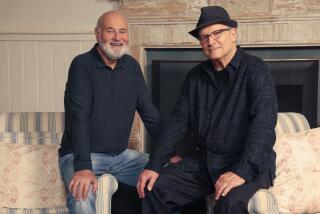Kind of evil
- Share via
In the neo-noir thriller “Drive,” Albert Brooks has invented a new type of bad guy: the murderer as mensch.
As Bernie Rose, a small-time mobster who tangles with the nameless getaway driver and Hollywood stuntman played by Ryan Gosling, Brooks kills with kindness. In perhaps the movie’s most blood-chilling scene, Bernie dispatches a hapless former friend with a single brutal knife stroke while cooing assurances that the pain won’t last long, as if soothing a baby.
The scenario is all the more unsettling because Brooks’ character comes across as a jovial, albeit vaguely shady, businessman who barks more than bites. He’s the opposite of the wild-eyed maniacs who typically wreak mayhem on movie screens.
That, Brooks says, makes Bernie all the more plausible -- and terrifying.
“When someone’s yelling their way through scenes, they’re targeting their actions,” Brooks said as he kicked back in his Beverly Hills production company office suite recently. “When I went to acting school, the kids that got the best grades were the kids that could cry on cue. But it didn’t really translate into careers for any of them, because the external is the easy part.”
Brooks, 64, knows the internal is what matters most. In a four-decade career as an actor, writer and director, he has forged a reputation as one of Hollywood’s canniest comic wits. As a middle-class dropout in “Lost in America,” a type-A television reporter in the Oscar-nominated “Broadcast News” and a deceased L.A. ad exec facing divine judgment in “Defending Your Life,” which he also wrote and directed, Brooks has scored empathetic laughs channeling characters who get tripped up by their own desires and discontents.
Frequently, an electric current of frustration and angry disillusionment rippled through these portrayals. Audiences chuckled while sensing that an explosion might be seconds away. Which is pretty much how human emotions tend to work, Brooks believes.
“All emotions are a breath away,” he says. “I’ve been to many funerals of funny people, and they’re some of the funniest days you’ll ever have, because the emotions run high. So emotion is sort of like the water main. And then how you channel it -- anger, comedy, sadness -- those are like the little house lines. But it’s all the same.”
With its galvanizing performances by Gosling, Brooks, Carey Mulligan and Ron Perlman, blunt-object action scenes and midnight-blue evocations of L.A.’s urbanscape, “Drive” has been hailed by some critics as a breakout accomplishment for its Danish director, Nicolas Winding Refn, as well as for screenwriter Hossein Amini, who adapted the script from James Sallis’ 2005 crime novel.
As a writer himself, Brooks fingers the minimalist but resonant dialogue as the script’s greatest strength, with its swerves, sudden stops and the tense silences that create reverse-gear momentum. He also admires the way the filmmakers infused a familiar genre with high-octane freshness.
“Nicolas took item A, item C, item D, item B, put it together and came out with something that felt like, ‘Hey, this is a genre come back to life again.’”
“Drive” pulled up at an opportune time for Brooks, who as he matures has eased into new types of character roles. “I’ve always loved the acting, and I think that if I wasn’t making my own films I probably would’ve taken 60% of what was offered me and done ‘Big’ and ‘Dead Poets Society’ and ‘When Harry Met Sally,’ ” he said. “I’m now at an age where the parts, some of them, could be very interesting. I did that part this summer with Judd Apatow’s movie (“This Is 40,” coming in December 2012), and it was Paul Rudd’s dad. Somebody said, ‘Was it odd playing a guy like Bernie Rose?’ It was odd playing the dad of a 40-year-old.”
But with a 15-year marriage to painter Kimberly Brooks, a 13-year-old son and an 11-year-old daughter to occupy him, he also has come to enjoy playing Albert Brooks.
“When I was younger, I wasn’t concentrating on good days. I was managing a career and trying to have a good year. It would always ‘lead’ to something, which never leads to anything except death, where everything leads to. And then as I got older, and then I had my kids and everything, I began to appreciate a great Wednesday. And the more I can do that, the happier I am.”
--
More to Read
Only good movies
Get the Indie Focus newsletter, Mark Olsen's weekly guide to the world of cinema.
You may occasionally receive promotional content from the Los Angeles Times.











